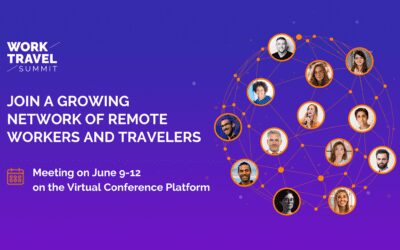|
|
If you’re considering the digital nomad lifestyle, or you’re already living as a digital nomad, it can be useful to know how to pick up work as you travel. Freedom is the name of the game when it comes to living as a digital nomad, but you’ll need a regular stream of income to support your adventures. In this article, we discuss how to pick up work while living as a digital nomad, including how to develop an understanding of the local job market and target your resume for success, whatever country you’re travelling in.
The digital nomad boom
With the transition to remote work, the digital nomad lifestyle has become increasingly popular. It’s become more possible to work in a wide variety of jobs remotely, while many companies have adopted a ‘remote first’ approach. This means scaling back physical office spaces in favour of more freedom for employees and, potentially, more flexibility over hiring decisions.
In 2023, there were an estimated 35 million digital nomads around the world, with the category firmly established in the world of modern employment. There’s also a host of countries now offering digital nomad visas. This makes the lifestyle more accessible than ever, with visas not only giving digital nomads increased rights to stay and work in the country, but also offering perks, such as tax relief or exemptions.
Finding work abroad as a digital nomad
So, how can you find work while travelling as a digital nomad? There are various things you can do to improve your chances of maintaining a steady income as you travel from country to country. Take a look at the tips below for help seeking out work as you travel:
Have a reliable base income
One way to ease the pressure as a digital nomad is to have a reliable foundation of regular work that you continue with as you travel from country to country. This might be a permanent role or a long-term client that’s happy for you to work from anywhere. Having a relatively stable stream of income can free you up to enjoy your travels and seek interesting work opportunities along the way to top up your earnings.
Develop desirable skills
You’re more likely to pick up work as a digital nomad if you have the types of skills employers are looking for. Remote working tends to favour certain roles and industries. The skills that are most in-demand for digital nomad jobs tend to be writing, creative skills such as design and web development, marketing skills, language skills and consulting skills.
It also pays to be aware of skills gaps in the countries you’re travelling to. Studies show the most scarce and in-demand technical skills include IT and data skills, engineering and sales and marketing.
Understand the local employment regulations
Whether you’re on a digital nomad visa or you’re hoping to apply for one, it’s useful to be aware of the local employment laws and regulations. This can help you navigate the process of applying for roles, including attending interviews and completing the necessary paperwork to start a new role, either as an employee or as a freelancer. For the EU, Europass can help you to prepare for work in 30 different countries, giving advice and guidance for each country covered by the scheme.
Find the best platforms for job opportunities
There are certain jobs platforms that work for digital nomads, no matter where you’re looking for jobs. Websites like Fiverr and Upwork can offer reliable work in various fields, while there are also specialist remote work websites that can be a useful source of leads. The major jobs listings websites are likely to have plenty of opportunities whatever your location, but it’s also worth investigating whether there are any local platforms that can you use to your advantage while travelling.
Use your network
Networking is a valuable skill to develop. Building a network of associates and colleagues in different countries can help you tap into job opportunities while you’re travelling. This could be online via networking sites such as LinkedIn, or specialist online communities depending on your skill set and profession. For example, the platform Behance offers a community for designers and creatives, enabling you to showcase your work while connecting with other designers and employers.
Work on your resume
One of the most effective things you can do to increase your chances of successfully finding work as a digital nomad, is to work on your resume. The tips below can help you prepare your resume for digital nomad jobs:
- Understand the local resume standards: resume customs and standards tend to differ from country-to-country. While US employers often favour a short, concise resume around 1 page long, Australian employers might expect resumes of three pages or longer. The sections of your resume are likely to remain broadly the same, but some details that are necessary in some countries are inadvisable in others. For example, including a personal photo or personal demographic information can be standard in European countries, but it’s best to avoid these for jobs in the UK.
- Write your resume in the local language: if you’re applying to work in a foreign country, it’s usually best to write your resume in the local language. If the employer doesn’t specify which language to apply in, use the same language as the job advert. Be mindful of variations in dialect and terminology when applying for jobs in English around the world. Adapt your resume to match the local spellings wherever possible. Once you’ve written your resume, have it reviewed and proofread by a native speaker if possible.
- Tailor your resume to the job description: adopting a tailored approach to every resume you submit gives you the best chance of success with your digital nomad job applications. It’s essential to have a targeted resume that matches the requirements laid out in the job description. Targeting your resume involves reading and understanding the skills and experience laid out in the job description, and making sure your resume reflects these, using keywords and phrases that match the job description where necessary.
Popular jobs for digital nomads
Working as a digital nomad while travelling suits certain professions better than others. Below is a list of some professions most suited to the digital nomad lifestyle. You may have the best chance of finding work in these disciplines while you travel:
Writing: writing lends itself to a travelling life, as you can do it anywhere as long as you have a computer and an internet connection. Writing roles include blogging, website writing, proofreading and journalism.
Marketing: various marketing skills lend themselves to working as a digital nomad. This includes SEO specialism, social media marketing and all types of content creating, including video production.
Design: you can find plenty of graphic design jobs as a digital nomad. Graphic design can be a solitary role, which makes it ideal to take with you as you travel.
Web development: with tech skills, including programming, particularly in demand, there’s always a chance of finding web development roles as a digital nomad.
Consulting: if you’ve had a successful career in business, you could work remotely as a consultant. This can include coaching, optimization and strategic planning roles.
Administration: as remote work becomes normalized, many more administrative tasks can be completed remotely, creating opportunity for digital assistant roles.
Education: tutoring can be a handy way to make extra money as a digital nomad. Language teaching is particularly relevant, and you can work via various online tutoring platforms.
Final thoughts
Living as a digital nomad offers you an exciting world of travel and exploration. However, it also provides the chance to gain valuable experience and boost your income by working in the different countries you visit. Enhance your chances of success by developing new skills that are likely to lead to remote work opportunities. Always be aware of the local standards and regulations, and create a targeted resume for every role you apply for, to make the best possible impression with local employers wherever you travel.












